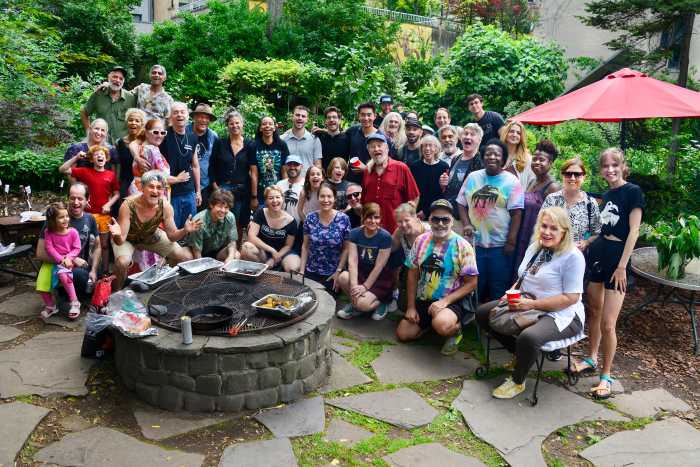BY ARTHUR S. LEONARD
State Supreme Court, ruling for lesbian co-parent, claims priority in ex-civil union case
In the first major appellate gay parenting decision to consider the interstate implications of a civil union, the Vermont Supreme Court unanimously declared on August 4 that a former civil union partner is the co-parent of a child born to her ex through donor insemination while they were residing together in Virginia.
Most significantly, the Vermont high court ruled that courts in Virginia do not have jurisdiction to quash the co-parent’s visitation rights.
The complex visitation dispute between Lisa and Janet Miller-Jenkins is not finally resolved by this ruling, since Lisa, who resides in Virginia with their child (and has since declared she is not lesbian), has a suit pending before the Virginia Court of Appeals. It is unclear whether Virginia courts would enforce a Vermont court visitation order.
Lisa and Janet, then residents of Virginia, went to Vermont in December 2000 where they had a civil union ceremony, and then returned home. The next year, Lisa became pregnant through donor insemination, and she bore their child, referred to in Justice John Dooley’s opinion as IMJ, in 2002. When IMJ was four months old, the family moved together to Vermont, but a year later decided to separate, and Lisa moved back to Virginia with the child.
Lisa filed a petition in the Rutland, Vermont, Family Court to dissolve the civil union, listing IMJ as the “biological or adoptive child of the civil union,” and requested that the court award her custody and give Janet visitation rights. The court made that award on a temporary basis, pending the case’s final resolution, but Janet only had one visit with the child, early in June 2004. Since then, Lisa has prevented Janet from having any contact, even though the Vermont Family Court found her in contempt.
There are two lawsuits pending. In the Virginia courts, Lisa succeeded in getting a trial judge to declare that Virginia does not recognize any relationship between Janet and the child, a decision Janet has appealed. In Vermont, the state Supreme Court made clear last week that Janet is a parent of the child, entitled to exercise visitation rights, and also upheld the Family Court’s contempt order against Lisa.
But Janet will only get to exercise her visitation rights if Lisa suddenly becomes cooperative or if the Virginia courts accord full faith and credit to the Vermont order. Lisa argued that because both women resided in Virginia when they went to Vermont to be civilly united, that union was invalid, since they had no intention at that time of living there. Dooley decisively rejected this argument, finding that there is no residency requirement for a Vermont civil union, and there was never any legislative intent in that regard either.
Lisa argued that as a result of the federal Defense of Marriage Act and a similar provision of Virginia law that forbids any recognition of same-sex relationship, including civil unions, the state is free to refuse to enforce a Vermont visitation order that relies on the couple’s Vermont union. Dooley found this argument irrelevant to the question pending before the Vermont Supreme Court—whether there was any ground to overturn the Vermont Family Court’s visitation and contempt orders. Having found that Vermont courts had jurisdiction of the case and that Lisa deliberately violated the Family Court’s visitation order, the Supreme Court saw no grounds for a reversal.
Janet is represented by Gay and Lesbian Advocates and Defenders, the Boston-based New England public interest law firm, and its cooperating attorney in Vermont, Theodore A. Parisi of Castleton. They are hopeful that the very detailed Vermont Supreme Court opinion—which concludes that both the Uniform Child Custody Jurisdiction Act, recommended for adoption by all states, and the federal Parental Kidnapping Protection Act strongly favor Janet’s visitation claim—will prove persuasive to the Virginia Court of Appeals and help to overturn the trial court order in that state.
If the Virginia courts resist this, however, Janet’s resort would be to the United States Supreme Court, which would have to sort out the full faith and credit issues in light of clashing state policies on the legal status of same-sex partners.
Dooley carefully wrote his opinion to demonstrate that Janet’s claim to visitation as a co-parent was not fully dependent on her former status as a civil union partner of Lisa. The high court justice observed that courts in Vermont and several other states have recognized second-parent visitation claims in the absence of civil unions, based on legal theories taking into account the intentions of couples at the time of their child’s birth and the degree of psychological bonding between the child and the co-parent.
gaycitynews.com






























